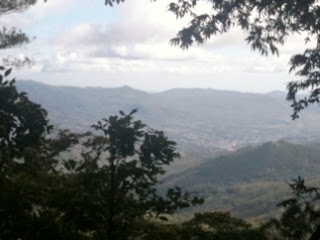Juan and I had an incredible month here in Nicaragua. The overwhelming thing that we took away was the kindness, generosity, and openness of the Nicaraguan people. We felt completely integrated in our home stay and at the clinic and felt like we were Nicaraguan by the end.
As stated, the homestay was the highlight of the trip. We were welcomed into a Nicaraguan family's life and although we did give them a "gift" for hosting us, they were not even expecting any compensation for hosting us. Their lives may not be rich in material wealth, but they have rich full lives that they are able to enjoy.
 |
| Fun at the homestay |
Spending quality time with your family and friends for hours every night without any significant daily stress/concerns sounds like a fantasy for most of us, but it is their reality. They still work very hard and often return from work exhausted, but once home, the only task at hand is enjoying each other's company and occasionally fixing a dirt bike.
Having made village life sound like a dream, there are some potential concerns to raise. There are significant gender roles which only very rarely altered. The women spend most of the day cooking and cleaning while the men work and later have fun. As stated, people would come from the surrounding houses to hang out all night, but these were almost primarily men/boys. I presume the women must stay home and tend to the children or housework. Also, homosexuality is not very well accepted and can cause people dealing with it severe distress.
 |
| The clinic |
There is a lot of room to improve in terms of health care (see below). So while obviously not perfect, in my mind village life is closer to how humans were meant to live than our workaholic, computer screen to TV screen, dollar to dollar, lifestyle.
 |
| Elliot in action at the clinic |
We learned that in the past measures were taken to control the rat population in each household at risk in order to reduce the cases of leptospirosis. There is extreme vigilance with reporting epidimiology data, especially infectious disease data. The clinic knows every pregnant woman in the village and what her level of risk is. All of the staff at El Tololar are extremely dedicated to the care of their patients regardless of the obstacles. The set up is in place for great health care delivery, but the resources are simply lagging way behind.
 |
| Clinic workers |
The clinic at times cannot handle the patient load capacity. The charts are falling apart and near impossible to find when needed. The pharmacy is inadequately stocked and we are often telling patients that they need to go take a bus ride to Leon to buy their chronic medications or go without them. I believe the current system for providing contraception has too many barriers and likely leads to numerous unwanted pregnancies and teen pregnancies.
So from what I saw, the system is in place, the personel is excellent and improvements are constantly being made, but until resources improve and are more consistent the health center in El Tololar will continue to struggle to fully meet the needs of its patients.
 |
| Waiting room |
Thanks for reading. Hopefully, I inspired you to hop on a plane and visit the amazing country of Nicaragua!











.JPG)



